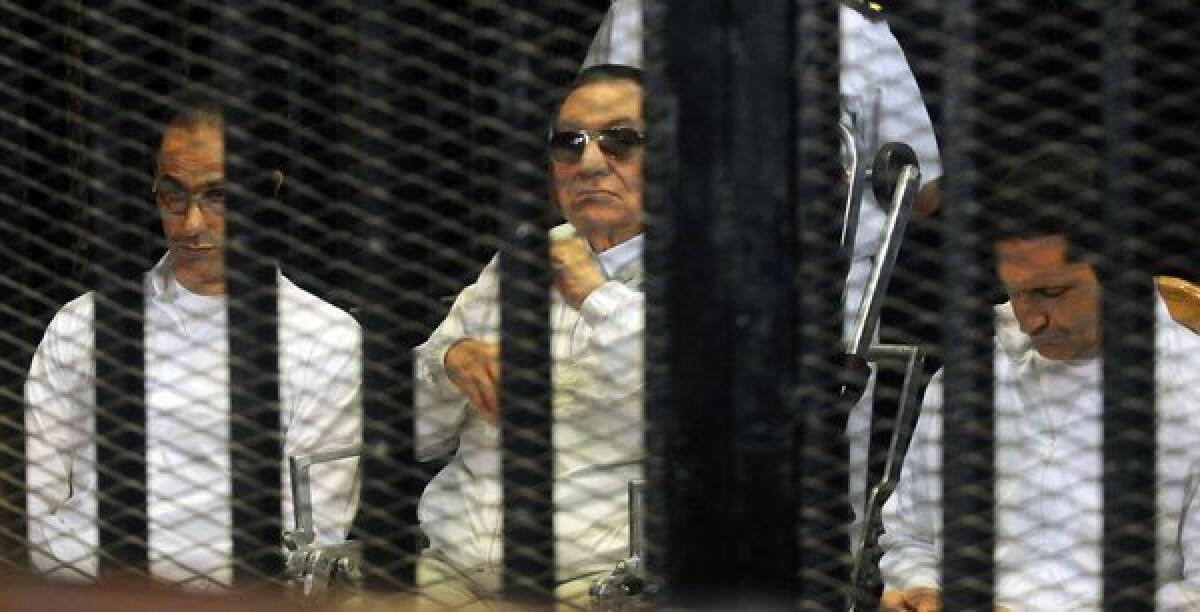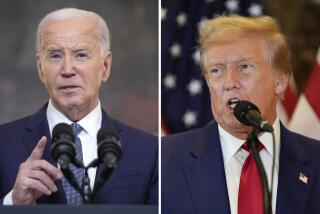Power, politics underlie two trials in Egypt

CAIRO — Courtrooms in Cairo echoed Sunday with the alleged crimes of fallen leaders who personify a divided nation that cannot escape its repressive past even as it moves to crush those with designs on its future.
In a downtown courthouse, a judge postponed until October a murder-related trial against Muslim Brotherhood leaders, including Supreme Guide Mohamed Badie. The case is the latest twist in the Brotherhood’s tumble from power that began last month when the coup that overthrew President Mohamed Morsi dashed Islamist ambitions to run the country.
On the outskirts of Cairo, not far from the international airport, former leader Hosni Mubarak, who was freed from prison on bail last week, peered out from the defendant’s cage during his retrial for complicity in the deaths of more than 800 protesters during the 2011 uprising against his rule. His case was adjourned until Sept. 14.
The legal ordeals of the longtime enemies are telling glimpses into a nation that has yet to rise above suspicions between Islamists and a state that since its independence in the 1950s has been dominated by military men. There is little pretense of democracy; the fight for the nation’s character has shifted from the realm of politics to police raids, prison cells and courtrooms for reigning in government opponents.
Mubarak represents an authoritarian state that has been revived by a military-appointed government that is persecuting the Brotherhood as terrorists. More than 900 anti-military protesters and Brotherhood supporters have been killed by security forces in recent weeks. At least 1,100 Islamists, including Morsi, have been arrested on charges including murder and espionage.
“The state has become more vindictive than legal,” said Engy Hamdy, an activist with the April 6th movement, a key architect of the uprising against Mubarak. “If we stay this way any ruler who comes will have the tools to work for his own interests and not for the interests of the people. ... It’s a reflection that Mubarak is not just a name or a person, it’s an ideology that persists even until now.”
The court on Sunday delayed the trial of Badie and two of his deputies, Khairat Shater and Rashad Bayoumi, until Oct. 29. The Brotherhood leaders are charged with inciting violence that led to nine deaths during protests outside the movement’s headquarters in June. They have called the new government illegitimate and Badie has said he does not recognize the court’s jurisdiction.
Authorities said the three men did not appear at Sunday’s session for security reasons. Government critics view the case against the Brotherhood as politically motivated even as millions of Egyptians have supported the military crackdown on the organization.
Mubarak’s legal fate appears less certain than it did two years ago, when he was flown from his palace in Sharm el Sheik to Tora prison. Aside from his murder-related retrial, he faces corruption charges. Some legal analysts say the evidence against him is weak and that he could escape conviction. He was released from prison last week and placed under house arrest in an army hospital.
The military and police, who were criticized for human rights abuses after Mubarak’s overthrow, are less concerned with the sins of the state’s past than with eviscerating the Brotherhood and other Islamist organizations that they regard as fomenting radicalism.
The government will “not hesitate to confront any threat that targets the Egyptian national security,” the Cabinet said in a recent statement. It added that officials “will continue to lever the national interest above all other considerations, rejecting any foreign pressure.”
The security crackdown has expanded to other dissidents. Two activists in the April 6th movement – Esraa el-Fattah and Asmaa Mahfouz – are under investigation for allegedly spying and receiving funds from foreign countries. Such charges have been common in recent years as the state has moved to discredit those who accuse it of civil-rights violations.
International journalists have also been warned by authorities not to appear sympathetic to the Brotherhood and to stop “severe bitterness” toward Egypt. At least two journalists, including an Egyptian and a cameraman for Sky News in Britain, were killed in the recent unrest. A number of reporters have been detained and others have been threatened or attacked by security forces and pro-military mobs.
Canadian citizens John Greyson, a filmmaker, and Tarek Loubani, a doctor, were arrested Aug. 16 and accused along with seven other foreigners of “assisting Muslim Brotherhood members” in an attack on a police station.
They were reportedly heading back to their hotel when they were swept up in an arrest of Egyptian protesters near a military checkpoint. Greyson and Loubani were on their way to the Palestinian-controlled Gaza Strip for a documentary and medical work.
“Tarek and John are in good health,” said a Facebook page started on behalf of the men. “Yet they are still being imprisoned, and there is no plausible justification for this.”
ALSO:
Freed drug lord missing, but present in Guadalajara
China’s Bo lashes out at chief accuser at corruption trial
Syria says it will let U.N. inspect alleged chemical-attack sites
Twitter: @JeffreyLAT
More to Read
Sign up for Essential California
The most important California stories and recommendations in your inbox every morning.
You may occasionally receive promotional content from the Los Angeles Times.











